The grape variety does not have the best reputation, especially not among wine lovers. They consider white wines made from this grape variety too banal, too unrefined, too monotonous in taste and too modest in aroma. This blanket judgement, which prevailed in the fifties and still clings to the wine, originates mainly from a time when mass was cultivated in viticulture. Not only with Müller-Thurgau, everywhere where vines could promise a rich harvest. This promise was delivered at that time, the Müller-Thurgau or Riesling-Sylvaner, as it was once called on the basis of the breeder's specifications. The vine is unproblematic to grow, thrives almost everywhere, ripens early and delivers high yields. Connected with this: an undemanding character, "which gives even inexperienced wine drinkers their first harmless wine pleasures". Reason enough to cultivate the grape variety, which had already been newly bred in 1882, all over the wine world - especially in the years after the Second World War. Just in time to close the wine supply gap.
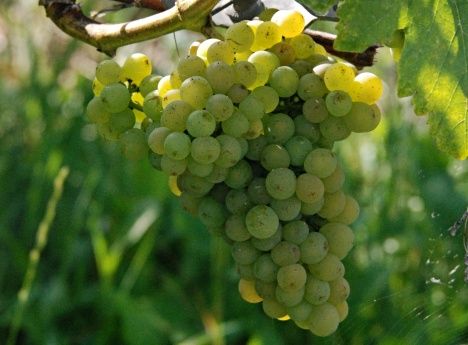 |
| Müller-Thurgau% the most important white wine variety in eastern Switzerland (Photo: P. Züllig) |
Even today, Müller-Thurgau is the most frequently cultivated new variety in the world, 40,000 hectares are said to be cultivated, and even today its bad reputation is so widespread worldwide that the grape variety hardly receives any attention in wine circles - or then it's like this: "In summer, a clean Müller-Thurgau is an excellent spritzer wine." Or: "One can only hope that Müller-Thurgau will lose its importance for German viticulture and be replaced by higher-quality and more demanding grape varieties. The fact that there are still really good Müller-Thurgau wines now and then is less due to the grape variety than to its winemakers." When Nathalie suggested and organised a wine rally on the topic of "Müller-Thurgau" on www.cucina-casalinga.blogspot.ch almost two years ago, she had to admit: "Right at the beginning I have to confess - and as a cooking blogger I hope I'm allowed to - that I didn't know that Müller-Thurgau had such a bad reputation. What sceptical remarks were made in the classic wine blogs when they heard about my topic. This negative image had not reached me. I have been drinking Müller-Thurgau for a long time. Mostly from small vineyards from Franconia or Lake Constance, and of course from South Tyrol."
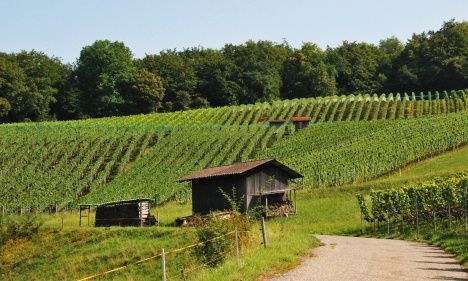 |
| Vineyard in Switzerland: red grape variety Pinot Noir% white grape variety Riesling-Sylvaner (Photo: P. Züllig) |
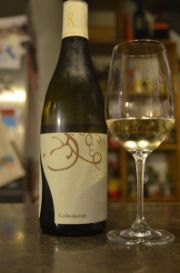 |
| Huber Winery & German Wine Discovery Society% "Love Marriage" Müller-Thurgau 2012% Baden (Photo: Blog www.schnutentunker.de) |
The topic - no matter how sceptically eyed - is interesting because more than twenty blogs took part in this wine rally and presented examples ranging from good basic wines to high-quality noble drops, from specialities to popular everyday wines. I myself set out under the motto "The unloved child" in search of wine children called "Müller-Thurgau" that people love. Then, when even Carsten Henn, whom I hold in high esteem, made a public confession in the Vinum blog: "...then there was a wine for the evening that I want to occupy myself with, that I want to enjoy with more than one sip. This time it was the best Müller-Thurgau in Germany, and I'll be so bold as to say: the best dry Müller-Thurgau that Germany has ever had..." - that was when the spell was broken for me, too. I really wanted to get to know it, the best Müller-Thurgau, which also bears the romantic name "Love Marriage". I didn't get to know it, neither the wine nor its creator, the top winemaker Bernhard Huber from Breisgau in Baden. He died a few months ago at the age of 55. In an appreciation I read: "...he was one of the few who even coaxed new facets out of Müller-Thurgau and made it clear that wines with a lot of depth can be won from this vine in decline."
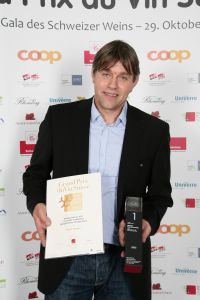 |
| Award winners 2014% Müller-Thurgau category (Photo: Vinum) |
Wines with depth from the Müller-Thurgau grape variety, that's what I would like to see, not least because it is the most commonly planted white variety in German-speaking Switzerland. It was bred by a Swiss (by Hermann Müller from the canton of Thurgau), not in Switzerland but in Germany, at the "Königliche Lehranstalt für Obst-, Wein- und Gartenbau in Geisenheim", and it also bears his name, just not in Switzerland. Here the grape variety - typical Swiss obstinacy - is still called "Riesling-Sylvaner", at least with a wrong parent, because it has since been proven that the father was not Sylvaner but Madeleine Royale. My wish is coming true more and more often, it does exist, the "Riesling-Madeleine Royale" with depth, for example at Thomas Marugg in Fläsch. I didn't find it just like that, but I also didn't look for it in the Bündner Herrschaft, which is actually home to the best Pinot Noirs in Switzerland. The "Grand Prix du Vin Suisse", the grand prize of Swiss wine, helped me and declared Thomas Marugg's 2012 Riesling-Sylvaner the winning wine in the "Müller-Thurgau" category.
All I had to do was taste it, agree or disagree. I agreed, but I can't say whether it's really the best. In the meantime, I have come across many a good to excellent Riesling-Sylvaner - pardon, Müller-Thurgau - not only in Switzerland, but also, for example, at Horst Sauer in the Maindreieck or Werner Anselmann in the Palatinate. But there the wines - in the illustrious circle of the greats - hardly stand a chance. I now maintain - my friends in Germany may beat me - that a Müller-Thurgau even from a renowned winery like Horst Saurer has no chance. At least two rating points less just because it is a Müller-Thurgau and not a Riesling, even before it is tasted at all. I wonder if a young wine - that is, a wine that wants to be drunk young - is per se the worse wine. I wonder whether the taste standard that has become established for many - almost all - grape varieties is really the most important yardstick for determining quality? It almost seems so, because I make this observation even with the most famous red wines, Bordeaux for example. Admittedly, as a red wine drinker, I understand far more about Bordeaux than I do about Riesling and Müller-Thurgau. Bordeaux is also much more dependent on international reputation: a few more favourable Parker words and the trend is made.
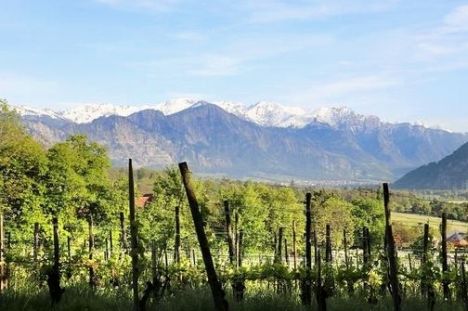 |
| Bündner Herrschaft% a red wine region% but there are also excellent white wines here (Photo: P. Züllig) |
The situation is different with Müller-Thurgau, the stepchild (in the truest sense of the word) of white wines in Germany, but also here in Switzerland. Hardly anyone talks about them, they are regarded - at best as basic or everyday wines - as "uncomplicated, easily accessible in terms of flavour, and a pleasure to drink because of their harmonious character traits". Is this really the norm, or are there not exceptions, many more exceptions than wine critics like to register? On my little campaign through Swiss Riesling-Sylvaner, I met a few wines of which one could say something similar to the wine journalist (and writer) Carsten Henn of the Baden "Liebesheirat": "A wine that combines the lightness and spiciness of a classic Müller-Thurgau with a long finish and complexity. It has an uncanny drinking flow and even mineral depth. This is a Müller-Thurgau of a new generation - and hopefully the beginning of a renaissance for this underestimated vine, the result of a love match. It can still be enjoyed on any day - and not just Valentine's Day."
Sincerely
Yours/Yours